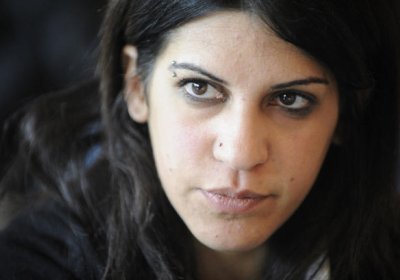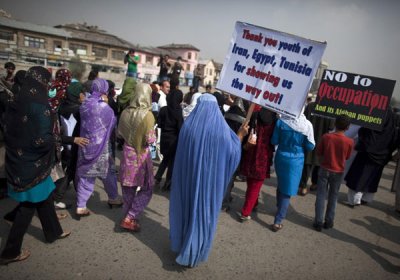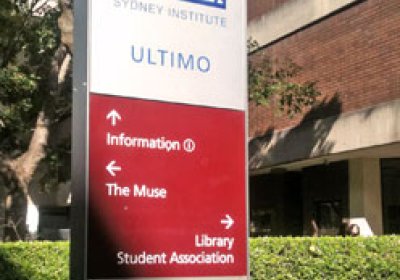Lina Ben Mhenni, 27, is a Tunisian blogger and activist for freedom of speech, women’s rights and student rights. Her blog, A Tunisian Girl, was censored under Zine el Abidine Ben Ali’s regime.
During the early days of the uprising against Ben Ali that started on December 17 last year, she travelled to the rural Tunisian cities of Sidi Bouzid, Regueb and Kasserine to document police repression and catalysing protests throughout the country.
898
“We Tamils, inside and outside the island of Sri Lanka, still want an independent state,” Visuvanathan Rudrakumaran, prime minister of the Transnational Government of Tamil Eelam (TGTE), told me recently in New York.
“And because the war crimes and severe brutality of the Mahinda Rajapaksa government against our people have become well known, our cause is being spoken about all over the world.”
A blog of those that support the Occupy Wall Street protests, that began in New York in September and have since spread to hundreds of US cities, hosts a series of personal testimonies from ordinary people across the United States. It indicates the source of the deep anger at the corporate elite that have become rich off their suffering. A selection are published below.
* * *
There’s no doubt that the explosion of social media, mobile technology and online-organising capabilities have dramatically altered the battle terrain of class struggles today in ways good, bad and ugly.
From the Arab Spring to New York’s ongoing Occupy Wall Street protests, social media and online organising are clearly transforming the way that small, isolated campaigns develop into mass movements in the streets. But how do we separate the genuinely useful aspects of social media from the “data smog” of media hype?
There is a sharp reality disconnect in the Black community.
On the one hand, the Black population continues to support the first African American president, Barack Obama, by more than 90%.
Yet the plight of the Black communities is at its worst condition in three decades. Official unemployment is over 16% ― twice that of whites and iabout 30% for young African Americans.
Black household income is in decline and the lowest of the five major ethnic groups. Poverty is at the highest levels in 30 years.
The Woman Who Shot Mussolini
By Frances Stonor Saunders
Faber and Faber, 2010
375 pages, $32.99 (pb)
The Honourable Violet Gibson was not like the other women of the Anglo-Irish elite when it came to Benito Mussolini, the leader of Italy's fascists.
While Lady Asquith (wife of the former prime minister) was delighted by Mussolini, and Clementine Churchill (wife of the future prime minister) was awestruck by “one of the most wonderful men of our times”, Violet Gibson aimed a revolver at the fascist dictator in Italy in April 1926 and shot him in the nose.
Crowds burned a US flag in Kabul on October 6 at a rally to mark the 10th anniversary the next day of the US-led invasion and occupation of Afghanistan.
The Europe Against Austerity conference held in London on October 1 was attended by 681 people, including 150 from outside Britain. This happened the same weekend that two big demonstrations took place.
In Glasgow, a “People First” demonstration of 15,000 called by the Scottish TUC took place on October 1.
The next day, 35,000 joined a demonstration in Manchester outside the governing Conservative Party conference, which was called by the Trades Union Congress and backed by the Coalition of Resistance and the Right to Work Campaign.
As the world watched the Egyptian people overthrow the hated dictator Hosni Mubarak earlier this year, there would have been many who asked themselves: Could it happen in my country too?
Some did more than wonder, they took to the streets and tried to “walk like an Egyptian” and a wave of people’s power began to sweep the Arab world. But this wave of revolt didn’t stop there.
There were powerful reverberations in Spain, Israel, Malaysia and even in the United States, the world’s richest country.
Members of the Philippines Air Lines Employees Association (PALEA) have been engaged in three weeks of pickets at the Philippines Airlines (PAL) terminal at Ninoy Aquino International Airport in Manila.
About 2600 ground crew have fought against forced contractualisation — the replacement of permanent, secure jobs with contract labour.
PALEA president Gerry Rivera told Green Left Weekly the dispute had its origins in 2009 when PAL management declared their intention to outsource the roles of the 2600 ground crew.
NSW education minister Adrian Piccol has announced a process of “community consultation on the reform of TAFE and the vocational education and training sector in NSW”.
The NSW Liberal government plans to repeat its Victorian counterpart’s attacks on public education and further privatise vocational education. The government plans to encourage private colleges and universities to undercut TAFE providers. It will offer a publicly-funded student voucher system to achieve this.
Pro-democracy protesters in Bahrain have gone on the offensive in the face of government repression and harsh sentences for activists arrested in the first wave of protests in February and March.
Large protests began on September 23 against sham by-elections for Bahrain’s toothless parliament. Most people heeded the democracy movement’s call for a boycott — only about 17% turned out to vote, FT.com said on September 25.
Police blocked attempts by protesters to reach the previous epicentre of the protests — the now-demolished Pearl Roundabout, known as Martyr’s Square by protesters.
- Previous page
- Page 2
- Next page










